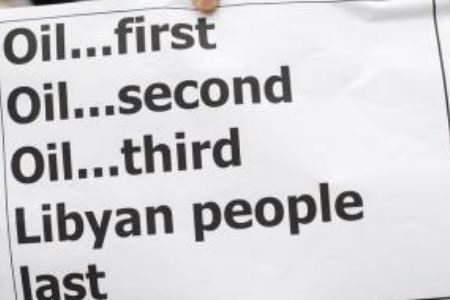Britain fears huge loss in Libya


The British Prime Minister should be more concerned when he makes a ‘far more aggressive’ call for military intervention in Libya than any other Western leader.
According to what British officials say privately, there is a more pragmatic concern, based on which David Cameron would be forced to intervene in the crisis-stricken North African country to save UK’s vast oil investments in Libya.
The London-based oil company British Petroleum (BP) has developed a huge stake in Libya’s vast national resources after the Libyan despotic ruler Muammar Qaddafi dismantled his feared nuclear weapons program on December 19, 2003 and opened up his country’s lucrative market to western companies.
Thus, the British Prime Minister is worried that a large and sudden loss of BP revenues in Libya could damage his government’s tax base badly at a moment when Britain is struggling to recover from a deep recession.
For the same reason, Cameron and his close associates had dispatched to Libya last week a special team to engage in talks with revolutionary forces, possibly to sell them weapons.
The Prime Minister and his aides were cut red-handed and ashamed when they found themselves embroiled in the scandal over the botched top-secret spy mission, which included the UK’s foreign intelligence agency MI6.
Libyan revolutionary forces captured and then released an eight-member group of British SAS (Special Forces) and a MI6 spy after they landed near the city of Benghazi by a helicopter without having received a landing permission or even an entry authorization from Libyan authorities.
The revelation sparked angry reaction from the opposition Labour Party members who accused Cameron of trying to launch a military intervention without a UN authorization.
At the House of Commons, MP John Baron urged the government to learn not to lecture countries about democracy, when Britain has supplied weapons to dictators.
The comments came during a debate at the Commons on the situation in Libya, where Baron, Basildon and Billericay MP, pressed William Hague, the Foreign Secretary, to rethink Britain’s approach.
“Apart from the irony of sending a warship named after a pork sausage to rescue Brits from a Muslim country, surely the lesson from this episode is that we should stop meddling and be very careful before we lecture countries about democracy, when we have been supplying their autocratic leaders with crowd control weapons”, Baron said.
But, government officials appeared defiant, when Liam Fox, speaking ahead of a meeting of NATO defense ministers in Brussels, suggested that there could be an ‘alternatives’ to a pre-emptive strike.
Britain’s defense secretary said a pre-emptive strike against the Libyan air force would not necessarily be required to impose a no-fly zone.







